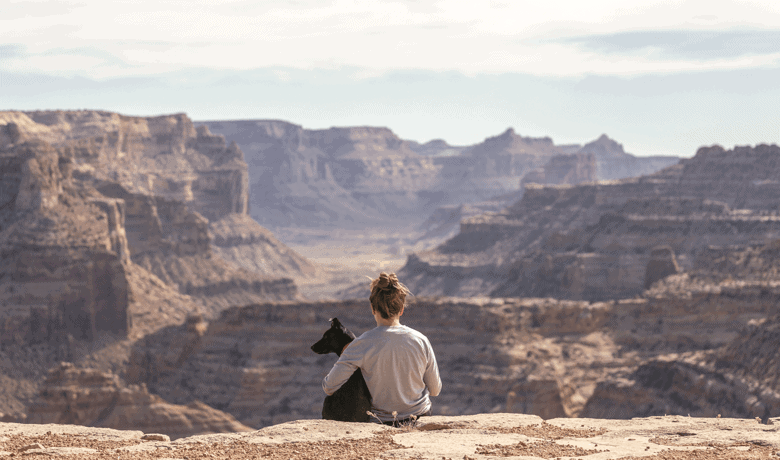Learning to be still can be difficult. Imagine, if for just a few minutes per day, instead of filling each moment with doing something, you simply embraced not doing anything?
Anything at all…
That instead of stuffing each moment with a distraction or trying to cross something off your to-do list, you focused instead on just being.
By learning to be still, you can harness the benefits of reduced stress, increased enjoyment, and a calmer pace of life. This mindful practice helps you become more engaged with the present moment and begin to experience the vast richness it has to offer.
Learning to be still
Learning how to cultivate stillness and stop all doing can be challenging.
We now live in a world where there’s an endless source of distraction available at your fingertips at any given moment.
Committing yourself to being truly present in the here and now takes dedication and let’s be honest, lots of patience. It’s easy to give up and let your mind wander away with each exciting thought that passes by.
Learning to be still doesn’t just mean sitting down on the couch watching TV. Because although watching TV might stop your physical body from moving, it doesn’t foster stillness in your mind.
The temptation to fill your senses with stimulation is so high, that it’s become like an addition for many people.
Just think about it for a second. When is the last time that you focused on not doing anything but just being?
Or, ask yourself, how long can you sit down and do nothing at all? No TV, no phone, no talking, no planning, nothing… before feeling restless?
Our obsession with busyness
We’ve become a culture that values busyness.
When’s the last time you asked someone how they’re doing only to be responded with “I’m busy!” or “I’m so busy!”?
Personal calendars are overflowing, many Americans aren’t taking their lunch breaks or vacation time, and weekends are full of to-do lists.
For many, busyness is self-imposed. It can make life feel full because let’s face it, your day is full. Right up until the last minute before you close your eyes at night, you’ve got something on the go.
It’s not just adults either. Children now have homework, after school activities, sports, commitments until the late hours. This leaves little time left for unstructured time and play for their own personal development.
And what are the consequences of busy days?
Sleeplessness
A recent study conducted by the Centers for Disease Control and Prevention (CDC) found that 1 in 3 American adults don’t get enough sleep. Working longer hours, staying up late with tech devices, and general busyness can dramatically impact the quality of your sleep.
Insufficient sleep can contribute to numerous adverse health effects such as: depression, heart disease, obesity, heart disease and Type 2 diabetes.
Stress
If left unmanaged, chronic busyness can become the source of stress in your life.
With too many different tasks on the go, it can become overwhelming to get anything accomplished. Your mind simply doesn’t know how to manage the workload or know how to approach all of the items on your to-do list at once.
Physical illness
Elevated levels of stress hormones cortisol and epinephrine are linked to many health conditions. Overworking or having too much on the go increases your stress levels and puts you at greater risk for stroke and heart attack.
Common effects of stress on the body include: headaches, gastrointestinal problems, chest pains, high blood pressure, sleep disturbance, diabetes, heart attack, arthritis, and anxiety.
Benefits of stillness
Learning to be still can dramatically reduce stress levels, relieve anxiety, and promote relaxation. Not to mention the fact that it might also make you happpier!
When you do need to work, setting aside time to practice stillness can boost your productivity, creativity, and reduce the number of errors that you make.
By making time to stop all doing and focus on being, you learn to connect with the present. It’s here that you can check in with your body and see what it needs. Perhaps some rest, exercise, sleep are in order?
Being focused on the here and now also provides you with an opportunity to temporarily step back. Your commitments and responsibilities can wait.
The only thing you have to do right now is simply be “here” in this moment.
1. Release the need to fill time
If you’re a business person then you might have experienced a sense of idle anxiety. The moment you slow down or stop “doing”, you feel like you’re wasting time.
Yet productivity cannot happen around the clock. You need time to rest in order to repair your physical body, synthesize information in your mind, and simply- to unwind for your overall well-being.
By assigning yourself tasks, whether productive or otherwise to each minute of your waking day, you’re starving yourself of many
2. Grant yourself permission to do nothing
In order to learn how to be still, it’s important that you grant yourself permission to do nothing.
It seems counter-intuitive to not be doing something, doesn’t it? Almost as though you’re always expected to be busy or to be doing something. Or perhaps that you want to be seen as being busy all the time?
Unfortunately, busyness has burdened people with guilt and anxiety.
3. Stop reaching for distraction
What’s the first thing you do when you have an idle moment?
Reach for your phone? Turn on the television? Go online? Shop?
What if, instead of trying to do something at each unscheduled moment, you took this time to embrace stillness? You focused your full attention on being present in the here and now. And that alone became the extent of your doing.
Distraction is a form of deception for the mind. It steals your time by drawing your attention away from the present. It offers instant gratification in exchange for your focus.
Make an effort to identify different triggers that have you reaching for the TV remote or your phone. Is it boredom, tiredness, or stress?
4. Make friends with silence
We now live in a very loud world.
But before big cities, cars, SMS and email, humans spent a lot of time living in silence.
Silence in both the acoustic and digital sense.
According to the World Health Organization (WHO), excessive noise can be detrimental to your health. It interferes with daily life, can disrupt sleep patterns, causes hearing loss, and can negatively impact cardiovascular and psychophysiological functions. Additionally, too much noise makes you unproductive, easy to annoy, and can even change your behavior.
Excess sound from noise pollution is commonly caused by transportation, construction, industry, radio, and TV. Personal devices such as headphones, speakers, audio devices can also have negative effects.
A study conducted by Mimi Hearing Technologies BmbH found that the average person who lives in the city has hearing loss that is one to two decades beyond their actual age.
Silence fosters self-reflection. It gives you the time and space to process your thoughts. In this quiet space, you’re able to cultivate creativity, become more productive, and find relief from internal chatter.
5. Schedule time for stillness
You probably set aside time each day to work, sleep, eat, watch TV, maybe even exercise or meet up with friends.
If you’re going to learn to be still, the first thing you should do is schedule some time for it! Setting aside time each day for being is essential to your mindful practice. You can’t expect to just do stillness, you will have to learn to simply be in that stillness.
Find a time that you can commit to each day and do your best to stick with it. Start with a small and manageable time, perhaps even 5-10 minutes to get started. Building a good habit will take patience and perseverance so be compassionate with yourself.
If you miss your meditation practice today, pick it back up tomorrow without judgement or self-criticism.
Take away
In conclusion, learning to be still takes time, practice, and dedication.
Although there is a lot of effort and patience required to commit yourself to this mindful practice, the benefits can be life changing.
Additionally, you might even find that taking a little time off makes you more productive, creative, and focused!

